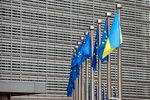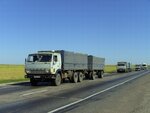Friday, the EU Council announced the adoption of the eleventh comprehensive package of sanctions, imposing restrictive measures on an additional 71 individuals and 33 entities identified as responsible for undermining or threatening the territorial integrity, sovereignty, and independence of Ukraine.
Among the sanctions' targets are individuals involved in inhumane deportations and forced adoptions of Ukrainian children to Russia, as well as Russian IT companies providing critical technology and software to the Russian intelligence.
The Council also sanctioned the Foundation for the Support and Protection of the Rights of Compatriots Living Abroad, linked to Russia's foreign policy goals, and separatist military officials convicted over the downing of Malaysia Airlines Flight MH17.
The listing includes individuals from the judiciary who issued politically motivated decisions against Ukrainian citizens opposing the annexation of Crimea, various businesspersons, a deputy minister, local Russian officials, and two banks operating in illegally annexed territories.
As of now, EU's restrictive measures related to actions threatening Ukraine's territorial integrity apply to nearly 1800 individuals and entities. Those listed are subject to an asset freeze, and EU citizens and companies are forbidden from making funds available to them. Natural persons are additionally subject to a travel ban.
The EU also underlined the importance of ensuring effective sanctions implementation at European and national levels, and its commitment to prevent their circumvention by third countries.
The relevant legal acts, including the names of the listed individuals and entities, have been published in the Official Journal of the EU.
The 11th package has these key elements:
TRADE MEASURES
- New anti-circumvention tool: this will allow the EU to restrict the sale, supply, transfer or export of specified sanctioned goods and technology to certain third countries whose jurisdictions are considered to be at continued and particularly high risk of circumvention. This new “anti-circumvention” tool will be an exceptional and last resort measure when other individual measures and outreach by the EU to concerned third countries have been insufficient to prevent circumvention.
- Extension of the transit prohibition for certain sensitive goods (e.g. advanced technology, aviation-related materials) exported from the EU to third countries, via Russia. This will also reduce the risk of circumvention.
- Addition of 87 new entities to the list of those directly supporting Russia's military and industrial complex in its war of aggression against Ukraine. They are subject to tighter export restrictions for dual-use and advanced technology items. In addition to the Russian and Iranian entities already listed, this now also covers entities registered in China, Uzbekistan, the United Arab Emirates, Syria and Armenia.
- Restriction on the exports of further 15 technological items found on the battlefield in Ukraine or equipment needed to produce such items. We are working in close coordination with partners and are adding Switzerland to the list of our partner countries.
- Tightening restrictions on imports of iron and steel goods by requiring importers of sanctioned iron and steel goods that have been processed in a third country to prove that the inputs used do not come from Russia.
- Prohibition to sell, license, transfer or refer intellectual property rights and trade secrets used in connection with restricted goods to prevent the sanctioned goods from simply being manufactured outside the EU.
- Extension of the ban on export of luxury cars to all new and second-hand cars above a certain engine size (> 1.900 cm³), and all electric and hybrid vehicles.
- A full ban on certain types of machinery components.
- Simplifying the structure of the industrial goods annex, by listing products subject to restrictions in one single section and with broader product definitions, to better identify goods subject to export bans and reduce circumvention of sanctions by misclassification.
TRANSPORT MEASURES
- A full ban on trucks with Russian trailers and semi-trailers from transporting goods to the EU. This will clamp down on the circumvention of the prohibition for Russian freight road operator to carry goods in the EU.
- Prohibition to access EU ports for vessels that engage in ship-to-ship transfers suspected to be in breach of the Russian oil import ban or G7 Coalition price cap.
- Prohibition to access EU ports for vessels if a vessel does not notify the competent authority at least 48 hours in advance about a ship-to-ship transfer occurring within the Exclusive Economic Zone of a Member State or within 12 nautical miles from the baseline of that Member State's coast.
- Prohibition to access EU ports for vessels which manipulate or turn off their navigation tracking system when transporting Russian oil subject to the oil import ban or G7 price cap.
ENERGY MEASURES
- End of the possibility to import Russian oil by pipeline for Germany and Poland.
- Insertions of strict and very targeted derogations to the existing export bans to enable the maintenance of the CPC (Caspian Pipeline Consortium) pipeline which transports Kazakh oil to the EU through Russia.
- Extension of the exception to the oil price cap for Sakhalin oil for Japan (until 31 March 2024).
ADDITIONAL LISTINGS
- Over 100 additional individuals and entities subject to asset freezes. This includes senior military officials, decision makers on the war, persons involved in the illegal deportation of Ukrainian children to Russia, judges who took politically motivated decisions against Ukrainian citizens, persons responsible for the looting of cultural heritage, businesspersons, propagandists, as well as Russian IT companies providing critical technology and software to the Russian intelligence, banks operating in the occupied territories and entities working with the Russian armed forces.
ADDITIONAL CLARIFICATIONS
- Revision of the listing criterion for individuals/entities engaged in circumventing EU sanctions, including those significantly frustrating EU sanctions.
- Addition of a new listing criterion to allow the designation of persons and entities operating in the Russian IT sector with a license from Federal Security Service of the Russian Federation (FSB) or the Russian Ministry of Industry and Trade.
- Insertion of a derogation allowing the sale of proprietary rights in a Russian joint venture co-owned with a listed person.
- Insertion of a derogation allowing the disposal of certain types of securities held with specified listed entities.
- Insertion of certain clarifications in the provision on information sharing between competent authorities and regarding the respect of the confidentiality of the communications between lawyers and their clients in the context of reporting obligations.
- Insertion of a derogation allowing the provision of services required for the establishment of a firewall removing the control by a listed person over the assets of an EU entity.
- Insertion of an exemption for the provision of pilot services in specific circumstances.
OTHER
- Extension of the media ban to 5 additional channels.
- Additional provisions on information exchange and reporting.
- Insertion of a temporary derogation to allow for the provision of prohibited services which are legally required for the divestment of Russian operators from the EU.
EU SANCTIONS
The EU's sanctions have three key objectives: degrade Russia's military capability to wage its war of aggression against Ukraine, deprive the Kremlin from the revenues it is financing the war with, and impose costs on Russia's economy.
Additionally, the EU Sanctions Envoy David O'Sullivan's outreach on cooperation to prevent circumvention is ongoing to key third countries.
First tangible results are already visible. Systems are being put in place in some countries for monitoring, controlling, and blocking re-exports. Anomalous, sky-rocketing trade figures for some very specific products/countries are hard evidence that Russia is actively attempting to circumvent sanctions.
Working with partners, the EU has agreed a priority list of sanctioned battlefield goods to which businesses should apply particular due diligence and which third countries must not export to Russia. In addition, within the EU, we have also identified economically critical goods for which businesses and third countries should be especially vigilant.
As guardian of the EU Treaties, the European Commission monitors the enforcement of EU sanctions by EU Member States.
Questions and answers
Official Journal
More information on sanctions



Comments
No comments on this item Please log in to comment by clicking here